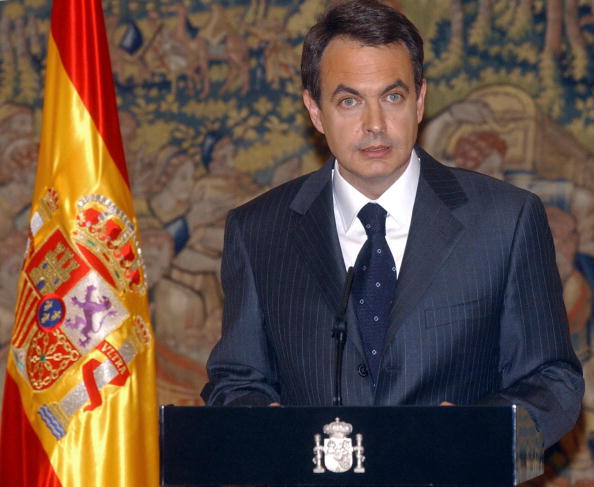
The case of Alberto Contador’s positive test from the Tour de France is growing in to political debate with some potential long term consequences. It is expected that the “Competition Commission” of the RFEC, Spain’s cycling federation, will meet today to agree their ruling then they will inform Contador. Tomorrow the details will be made public. It’s bound to leak.
Last Friday the Spanish Prime Minister José Luis Rodríguez Zapatero said in public that “there’s no legal reason to justify sanctioning Contador“. What to make of this? Well this wasn’t just any pundit, this was the head of government giving a view as opposed to leaving the authorities to do their job, the normal “separation of powers” principle.
My eyes were drawn to the addition of the word “legal”. Certainly there is no law in Spain saying the presence of Clenbuterol in your body can result in a sanction, just as there is no law that a soccer player fouling a rival gets a yellow card; instead these things belong to a system of rules and not Spanish law. Was the Spanish PM taking sides or just pretending to lend sympathy with a cleverly worded statement? Take your pick.
If there’s no law in Spain, there is the WADA Code. This is something every sports governing body in Spain, plus the Comité Olímpico Español, has signed up to. The Code contains the rules that govern anti-doping, from the testing protocol to the banned list to the sanctions for a positive test and it’s upheld all the way to the Court for Arbitration of Sport by a process of mutual consent.
Did he or didn’t he?
Strangely this isn’t the question. The actual point with the WADA rules is that once an athlete tests positive for a banned substance it’s up to them to prove it wasn’t doping:
10.5.2 If an Athlete establishes in an individual case involving such violations that he or she bears No Significant Fault of Negligence, then the period of Ineligibility may be reduced.
In simple terms, once a banned substance appears, it’s not “did you dope“, it’s “prove you didn’t“. Contador is heading for a ban unless he can prove that he wasn’t at fault. Note the word “establish”, proof is required rather than a mere hypothesis of contaminated beef.
It’s tough stuff. Imagine the police discovered a bank note inside your coat with a serial number that matches one taken in a bank heist. You get named in public as a robber and suspended from your job whilst it’s up to you to prove your innocence. But this frontier justice has been necessary to deal with the lawless nature of doping in sports. Athletes sign up to the code, it is a (professional) duty to go along with it, albeit within reason.

If the RFEC decision challenges the absolute nature of the WADA rules, expect an immediate appeal by WADA and the UCI. Even a one year ban will be an interesting prospect since, as yet, Contador has not established any proof of contaminated beef , he’s merely stated a belief. In the WADA might push for a full ban of two years.
It’s here that things get interesting. Will Contador find the Spanish establishment has got his back? Look at past events. There’s a sense the Spanish authorities circled the wagons over the Puerto affair, oddly we saw several Italians get banned but few Spaniards were troubled. We saw the difficulty involved in getting Alejandro Valverde banned despite a DNA match.Could something similar happen again? As Bonnie Ford has asked, is anti-doping a global matter under WADA or does a rider’s nationality weigh on the outcome?
If WADA feels the judgement is unsound and not in the spirit and letter of its rules then an appeal is highly likely although this will only perpetuate the saga, even if Contador will be free to resume racing. Nevertheless this can turn into a story that is no longer about Contador, lab readings and the Tour de France but politics and the legitimacy of WADA. There’s a lot at stake.

Could you let me know if AC can race if the UCI takes him to court?
Veloflexer: If you mean that the UCI appeals a verdict, then it depends…
– If the verdict is a one year ban then he can’t race.
– If he is cleared by the RFEC, then yes Contador will be free to race no matter what the UCI does. Any appeal will then take place in the background.
Thinking aloud some race organisers might not want him present given the controversy but it remains to be seen what happens. One way or another, I hope an agreement can be agreed by all but that remains to be seen. As I type I gather the UCI are in Madrid for talks.
I still say that expecting the RFEC to investigate and punish Contador is identical to asking USC to investigate and punish Reggie Bush. The RFEC have a lot to lose if Contador is suspended. Teams and countries should be punished along with the riders when someone tests positive, because it’s the teams and countries who profit when their riders are successful. Currently both of these groups are rewarded when a rider uses illegal enhancements, yet the rider bears all of the blame when he tests positive.
Cycling needs a truly independent body to regulate and enforce the doping rules.
Putting aside the sport’s doping regulations, if Contador is cleared it means that his defence of contaminated meat is accepted. In which case, if I worked for whatever federation represents the meat industry in Spain I’d be looking at legal action against him. By using contaminated meat as a reason for the clenbuterol he has directly accused meat producers and retailers in Spain of criminal activities in using a banned substance in the production of beef. He’d then be put in a position where he’d have to prove that crime through a legal system. If he can’t do that then he’s back to square one without a defence. The day I see a Spanish farmer taken to court for use of clenbuterol in his herd is the day I’ll trust Contador.
Roxanne: yes, that’s a sensible long term idea. In the meantime, the UCI and IOC might have to “encourage” the Spanish authorities to apply the rules.
Colin Barnes: indeed, and Spanish farmers are already very angry with the accusations, see http://inrng.com/?p=599 for more. But note that there have been cases of contaminated meat in the country too.
Typical Spanish response. Thanks for the info. Ever since I witnessed the ’85 Vuelta, I’ve yet to see fairness and honesty in Spanish cycling.
The worst thing, for clean cycling, would be if doping were made into a criminal offense in Spain (like Italy). No-one would get busted.
Alex: I want to steer clear of being harsh on any country, it’s not like an entire nation is involved in the plot. Many Spaniards will think Contador’s got off lightly.
But that said, there does seem to be a tendency amongst the Spanish authorities to favour their sportsmen ahead of others. Witness how the Italian CONI prosecuted Valverde, when the Spanish authorities went a long way to supporting him.
Spain had the opportunity to bust the doping world wide open with Puerto. Whether or not other sports like football were involved remains a mystery. Spanish cyclists have always had strong political connections. Behind the scenes lobbying is a very powerful thing, just ask any guy on K Street in Washington.
One last thing – can Contador ride whilst a CAS appeal is going on? Would the ASO let him ride the Tour?
At some point, the other nations involved with Olympic Sports need to start to flex their muscles. Everyone chastises the French for lacking any Tour winners since the 80’s…which oddly enough is when EPO and blood transfusions became fashionable in the sport.
Anyone wonder why so many cyclists also train in Spain? Is it the weather? Sure – but there are great places elsewhere to train with great weather and great mountain climbs. Could it be that doping just is not regarded as a serious issue in Spain?
The Spanish (and let’s face it – former Spanish colonies) have a stronger tendency to be sycophants in regards to their athletes, and seem to place a great deal of national pride based on athletic performance on the international stage.
On a lighter note – what’s with the comedy eyebrows?